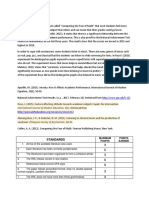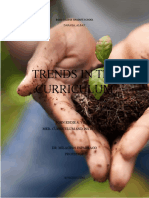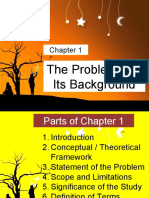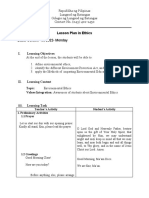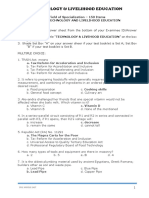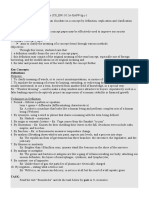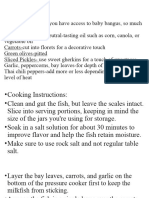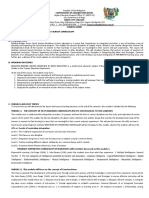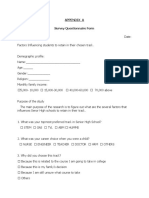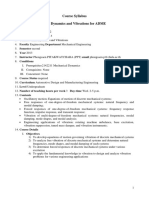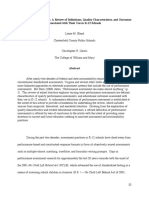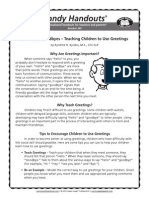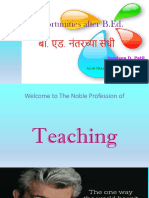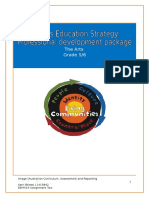0 ratings0% found this document useful (0 votes)
119 viewsHomework: "Homework Is An Extension of The Classroom "
Homework: "Homework Is An Extension of The Classroom "
Uploaded by
Fern Jacyrose RubricoHomework is an extension of classroom learning that can benefit students in several ways:
1. Additional homework of 30 minutes per night can increase a student's GPA by half a point.
2. Homework serves four main functions: prelearning to introduce topics, checking understanding, practice of skills, and processing concepts through reflection and application.
3. For homework to be effective, teachers should establish clear purposes and guidelines, differentiate assignments, provide feedback, and support students through homework programs.
Copyright:
© All Rights Reserved
Available Formats
Download as PPTX, PDF, TXT or read online from Scribd
Homework: "Homework Is An Extension of The Classroom "
Homework: "Homework Is An Extension of The Classroom "
Uploaded by
Fern Jacyrose Rubrico0 ratings0% found this document useful (0 votes)
119 views11 pagesHomework is an extension of classroom learning that can benefit students in several ways:
1. Additional homework of 30 minutes per night can increase a student's GPA by half a point.
2. Homework serves four main functions: prelearning to introduce topics, checking understanding, practice of skills, and processing concepts through reflection and application.
3. For homework to be effective, teachers should establish clear purposes and guidelines, differentiate assignments, provide feedback, and support students through homework programs.
Original Description:
Ppt about homework in teaching profession
Original Title
Homework
Copyright
© © All Rights Reserved
Available Formats
PPTX, PDF, TXT or read online from Scribd
Share this document
Did you find this document useful?
Is this content inappropriate?
Homework is an extension of classroom learning that can benefit students in several ways:
1. Additional homework of 30 minutes per night can increase a student's GPA by half a point.
2. Homework serves four main functions: prelearning to introduce topics, checking understanding, practice of skills, and processing concepts through reflection and application.
3. For homework to be effective, teachers should establish clear purposes and guidelines, differentiate assignments, provide feedback, and support students through homework programs.
Copyright:
© All Rights Reserved
Available Formats
Download as PPTX, PDF, TXT or read online from Scribd
Download as pptx, pdf, or txt
0 ratings0% found this document useful (0 votes)
119 views11 pagesHomework: "Homework Is An Extension of The Classroom "
Homework: "Homework Is An Extension of The Classroom "
Uploaded by
Fern Jacyrose RubricoHomework is an extension of classroom learning that can benefit students in several ways:
1. Additional homework of 30 minutes per night can increase a student's GPA by half a point.
2. Homework serves four main functions: prelearning to introduce topics, checking understanding, practice of skills, and processing concepts through reflection and application.
3. For homework to be effective, teachers should establish clear purposes and guidelines, differentiate assignments, provide feedback, and support students through homework programs.
Copyright:
© All Rights Reserved
Available Formats
Download as PPTX, PDF, TXT or read online from Scribd
Download as pptx, pdf, or txt
You are on page 1of 11
HOMEWORK
“Homework is an extension of the classroom…”
Prepared by:
Odessa O. Sandoy
Fern Jacyrose Rubrico
Mary Joy B. Buhawe
Joebie Grace H. Gamuzaran
Osias Mosqueda Jr.
Jeff
INTRODUCTION
• Research has proven that every 30 minutes of
additional home work a student does per night,
his or her overall grade point average (GPA)
increases about half a point. This means that if a
student with a GPA of 2.00 Increases the amount
of homework she does by 30 minutes per night,
her GPA will rise to 2.50 (Keith T.Z. (1982)
Students, for one reason or another, are not
always happy with homework. But when done
properly, homework leads to mastery of learning..
FUNCTION HOMEWORK
The homework is the last but not
the least part of a lesson plan.
What are the functions of
homework ? Vatterott, author of
ASCD member book “Rethinking
Homework” (2009) cites four, as
follows:
1.PRELEARNING
• The homework is a preparation for an in-
depth discussion of the next lesson by
getting an introduction or a background. It
is also a way of finding out what students
already knows about a topic or what they
are interested to learn more about the topic
by asking the students to write down
questions about what they were assigned
to read.
2.CHECKING FOR UNDERSTANDING
• By way of homework, teachers
gain insight into student learning.
Asking students to identify literary
devices in a short story shows
whether students understood the
lesson on literary devices.
3.PRACTICE
• Homework is an opportunity for
practice of rote skills such as
multiplication tables, spelling words, or
facts that need to be memorized for
internalization and mastery. For
homework to yield positive results,
practice must be correct and must be
distributed.
4. PROCESSING
• Homework is used when teachers
want students to reflect on
concepts discussed in class,
integrate and apply learned
concepts and skills in real life, and
think of new questions.
Guiding Principles in the use of Homework For the
learners to get the most from homework, the
following guiding principles may be of help:
1.The purpose of homework and outcome of
homework should be identified and articulated.
2.Homework tasks should be differentiated by:
a.) difficulty or amount of work
b.) by the amount of scaffolding provided and
c.) learners’ learning style or interest.
3. Parent involvement in homework should be kept to
a minimum. The role of parents in doing homework
should only be facilitative.
4. If homework is assigned, it should be
commented on. Of what use is homework if it is
not read, evaluated and returned?
5. Move from grading to checking. Focus on
feedback (Vatterott, 2009). Should homework be
graded? No! with Guskey”s (2003) observation:
“Grades on homework often get in the way of
learning ,demotative students, and create power
struggles between students and teachers and
between students and parents.”
6. Established and communicate a homework
policy.
• 7. Established a homework support programs. During
PTCA meetings share tips on how to make homework
time successful such as the following:
Designate a well-lit space for homework’
Establish time to do the work use the calendar to plan
when the work can be done if schedules vary.
Ask students specifics about the school day and what
needs to be done each night.
Tell them the numerous benefits of homework and provide
statement that parents can use with their child.
Assure parents that you want to hear if the student needs
a lot of coaching from parents.
THANK YOU!!
You might also like
- Course Design - A Guide To Curriculum Development For Teachers, 6th EditionDocument308 pagesCourse Design - A Guide To Curriculum Development For Teachers, 6th Editionameera mohammed abdullahNo ratings yet
- Historical Education Judaic 1200 BCEDocument11 pagesHistorical Education Judaic 1200 BCEMeganJean910No ratings yet
- 9093 English Language Example Candidate Responses Booklet 2015Document139 pages9093 English Language Example Candidate Responses Booklet 2015Mini80% (10)
- Narative Report PRIMALSDocument5 pagesNarative Report PRIMALSErwin Joaquin Cabigao100% (5)
- HomeworkDocument36 pagesHomeworkMae DacerNo ratings yet
- Project MethodDocument2 pagesProject MethodRhealyn BalaoNo ratings yet
- Lesson Plan Senior HighDocument6 pagesLesson Plan Senior HighAlmavi DanteNo ratings yet
- Study FormatDocument59 pagesStudy FormatEdNo ratings yet
- Education in Ancient China-1Document9 pagesEducation in Ancient China-1joyce ogolaNo ratings yet
- Stitching StoriesDocument2 pagesStitching StoriesPaul Cyrus Tan100% (1)
- DepEd Order No. 41 Series 2015Document101 pagesDepEd Order No. 41 Series 2015Ann Dabu100% (3)
- TL Module 4: Organisation and Administration Unit 1: Learning Activities For A Computer Laboratory EnvironmentDocument5 pagesTL Module 4: Organisation and Administration Unit 1: Learning Activities For A Computer Laboratory EnvironmentRenelle Erin AnsaleNo ratings yet
- Perdev - Day 4 - Knowing Oneself - 2Document2 pagesPerdev - Day 4 - Knowing Oneself - 2Jebby Rose A. Pan100% (1)
- Gonzaga - Capsule Research ProposalDocument4 pagesGonzaga - Capsule Research ProposalNoemi GonzagaNo ratings yet
- I. Objectives: A. Content Standards: B. Performance Standards: C. Learning CompetenciesDocument4 pagesI. Objectives: A. Content Standards: B. Performance Standards: C. Learning CompetenciesTJ SabadoNo ratings yet
- Authentic AssessmentDocument27 pagesAuthentic AssessmentMark Andrew FernandezNo ratings yet
- Assignment Chapter 2 Classification and Types of ResearchDocument4 pagesAssignment Chapter 2 Classification and Types of ResearchEvelyn AlaveNo ratings yet
- The Teacher and The LearnerDocument23 pagesThe Teacher and The LearnerUnique Alegarbes Labra-SajolNo ratings yet
- The Speaker Uses Few Notes To Look at and Talks in A Conversational Tone. ObjectsDocument3 pagesThe Speaker Uses Few Notes To Look at and Talks in A Conversational Tone. ObjectsDarlene Dacanay DavidNo ratings yet
- InterferenceDocument34 pagesInterferenceC M Numan AfzalNo ratings yet
- Trends in Tle Curriculum: John Eddie A. Villar Med-Curriculum and InstructionDocument6 pagesTrends in Tle Curriculum: John Eddie A. Villar Med-Curriculum and InstructionHayddie Mae Tuñacao CapunongNo ratings yet
- Curriculum - Theoretical DimensionsDocument46 pagesCurriculum - Theoretical DimensionsNuryani AhmadNo ratings yet
- Observation: Consumer Analysis ThroughDocument16 pagesObservation: Consumer Analysis Throughedilberto perezNo ratings yet
- Module 8 Communication For Academic PurposesDocument6 pagesModule 8 Communication For Academic PurposesPammieNo ratings yet
- The Teaching Approaches of The K To 12 Curriculum: The Enhanced Basic Education Act of 2013 in Section 5Document17 pagesThe Teaching Approaches of The K To 12 Curriculum: The Enhanced Basic Education Act of 2013 in Section 5Russel Aporbo100% (1)
- Chapter 1 The Problem and Its BackgroundDocument13 pagesChapter 1 The Problem and Its BackgroundLalaland AcadsNo ratings yet
- Final PapaerDocument23 pagesFinal PapaerAlexandriteNo ratings yet
- Southeast Asia Teachers Competency Framework: (SEA-TCF)Document43 pagesSoutheast Asia Teachers Competency Framework: (SEA-TCF)Ariane Ace de GuzmanNo ratings yet
- TLE 7 and 8 - FBS - Week8Document7 pagesTLE 7 and 8 - FBS - Week8Pork GinisaNo ratings yet
- Media Literacy Quiz - Arts and CreativityDocument10 pagesMedia Literacy Quiz - Arts and CreativityFRANCIS FRANCISCO. CLIMACONo ratings yet
- APPENDIX P CHED MEMO 75 S. 2017Document8 pagesAPPENDIX P CHED MEMO 75 S. 2017Centienne June BalboaNo ratings yet
- Local History Paper RubricDocument3 pagesLocal History Paper RubricHana NahaNo ratings yet
- Learning Competency/ies: (Taken From The Curriculum Guide) Key Concepts/ Understandings To Be Developed 1. ObjectivesDocument2 pagesLearning Competency/ies: (Taken From The Curriculum Guide) Key Concepts/ Understandings To Be Developed 1. ObjectivesLubeth CabatuNo ratings yet
- Lesson Plan in EthicsDocument9 pagesLesson Plan in EthicsAngel Mae DoceNo ratings yet
- Interact With An Artwork Activity #4: Art Criticism Artshop: Art CritiqueDocument5 pagesInteract With An Artwork Activity #4: Art Criticism Artshop: Art CritiqueVOHN ARCHIE EDJANNo ratings yet
- The Nature and Scope of Curriculum Development: in The Philippine ContextDocument25 pagesThe Nature and Scope of Curriculum Development: in The Philippine ContextCARLOS TIAN CHOW CORREOSNo ratings yet
- 001Document17 pages001Shella CortezNo ratings yet
- Demonstration Plan in TLE 8 (Fish Processing)Document9 pagesDemonstration Plan in TLE 8 (Fish Processing)lorna t. orienteNo ratings yet
- Media and Information Literacy - Q3 - Week 6Document5 pagesMedia and Information Literacy - Q3 - Week 6Angelo MartinezNo ratings yet
- Concept Paper BoondocksDocument2 pagesConcept Paper BoondocksshindigzsariNo ratings yet
- Methodology Chapter 3Document8 pagesMethodology Chapter 3ronilarbis100% (1)
- 3is Chapter 1 5Document72 pages3is Chapter 1 5YujinNo ratings yet
- Spanish-Style Sardines in Bangus OilDocument9 pagesSpanish-Style Sardines in Bangus OilIris Joy Lee GeniseNo ratings yet
- Technology As TutorDocument2 pagesTechnology As TutorE Lai ZaNo ratings yet
- Nature Scope and Function or Focus of Administration and Supervision in Home EconomicsDocument43 pagesNature Scope and Function or Focus of Administration and Supervision in Home EconomicsJesselyn CeaNo ratings yet
- DLL in Commercial Cooking 7-Week 7Document4 pagesDLL in Commercial Cooking 7-Week 7JeeNha BonjoureNo ratings yet
- ArtAppreciation PPT SculptorsDocument32 pagesArtAppreciation PPT SculptorsGIRLLYN BURZONNo ratings yet
- Cathie Lesson Plan FinalDocument10 pagesCathie Lesson Plan FinalJerrelyn MagtagadNo ratings yet
- SDO - Navotas - SHSIII - Q1 - M1 - Introduction To Research Process - FVDocument20 pagesSDO - Navotas - SHSIII - Q1 - M1 - Introduction To Research Process - FVAbigail ConstantinoNo ratings yet
- Word Doc With Capsu Header FooterDocument4 pagesWord Doc With Capsu Header FooterDan Christian VillacoNo ratings yet
- Strategic Analysis and Intuitive ThinkingDocument12 pagesStrategic Analysis and Intuitive ThinkingKrizelai Sophie Andrae SunioNo ratings yet
- Three Things Have Been Critical In: The Rise of The New LiteraciesDocument3 pagesThree Things Have Been Critical In: The Rise of The New LiteraciesMERRYFIL REYNo ratings yet
- Unit 1-Lesson 5 Product Its Nature and Sustainability-EntrepreneurshipDocument19 pagesUnit 1-Lesson 5 Product Its Nature and Sustainability-EntrepreneurshipElixa HernandezNo ratings yet
- 2223 Prof Ed 06 - The Teacher and The School CurriculumDocument8 pages2223 Prof Ed 06 - The Teacher and The School CurriculumCyl perezNo ratings yet
- Entrepreneurship-Whlp Week 2Document2 pagesEntrepreneurship-Whlp Week 2Gina Marmol100% (1)
- Course Outline and Module 1 in Building BridgesDocument14 pagesCourse Outline and Module 1 in Building BridgesEduardo QuidtaNo ratings yet
- Arts AcknowledgementDocument1 pageArts AcknowledgementPAULA ELLAINE LUCAÑAS MONTICALBONo ratings yet
- Appendix A Survey Questionnaire FormDocument7 pagesAppendix A Survey Questionnaire FormAmeerah BalahimNo ratings yet
- Ed Tech SyllabusDocument3 pagesEd Tech SyllabusGreBaptistChristianPre-School0% (1)
- 27 Selects Relevant Literature ADocument2 pages27 Selects Relevant Literature ADecember Ember100% (3)
- An Exploration On The Experiences of Grade 11 Academic Track Students Taking Modular ClassesDocument26 pagesAn Exploration On The Experiences of Grade 11 Academic Track Students Taking Modular ClassesJohn Jayson Santos100% (1)
- Maam Rapadas HomeworkDocument6 pagesMaam Rapadas HomeworkEmelito T. ColentumNo ratings yet
- I-Write Each Number in Expanded Form, Using The Power of 10Document2 pagesI-Write Each Number in Expanded Form, Using The Power of 10FarahNo ratings yet
- Importance of English Language in IndiaDocument3 pagesImportance of English Language in Indiaabhishek.mishraji100% (1)
- Course Syllabus 2142212 Dynamics and Vibrations For ADME: Day-Time Wed. 2-5 P.MDocument2 pagesCourse Syllabus 2142212 Dynamics and Vibrations For ADME: Day-Time Wed. 2-5 P.MOscar Ricardo Sandoval RodriguezNo ratings yet
- Performance Assessments: A Review of Definitions, Quality Characteristics, and Outcomes Associated With Their Use in K-12 SchoolsDocument18 pagesPerformance Assessments: A Review of Definitions, Quality Characteristics, and Outcomes Associated With Their Use in K-12 SchoolsMega Ayu LestariNo ratings yet
- Dick and Carey ModelDocument4 pagesDick and Carey Modelzenan50% (2)
- Meghan Petrie ResumeDocument1 pageMeghan Petrie Resumeapi-194307600No ratings yet
- Handy Handouts: Hellos and Goodbyes - Teaching Children To Use GreetingsDocument2 pagesHandy Handouts: Hellos and Goodbyes - Teaching Children To Use GreetingsIris PopescuNo ratings yet
- Communication Studies Syllabus PDFDocument2 pagesCommunication Studies Syllabus PDFChristina0% (2)
- Shelly HunsangerDocument2 pagesShelly Hunsangerapi-321267125No ratings yet
- Action Plan For Indigenous Peoples Education (Iped) Program CY 2015Document7 pagesAction Plan For Indigenous Peoples Education (Iped) Program CY 2015Johnny Reglos86% (7)
- Plan Lectie 2-8CDocument3 pagesPlan Lectie 2-8Cadirom47No ratings yet
- HD 426 Book Reflection 1Document5 pagesHD 426 Book Reflection 1api-321762589No ratings yet
- Teaching Grammar in ContextDocument18 pagesTeaching Grammar in ContextJelena Bobkina100% (4)
- Edusoft SolutionDocument33 pagesEdusoft SolutionMoniAndradeNo ratings yet
- Opportunities After B.ed.Document24 pagesOpportunities After B.ed.sandeep dagdu patilNo ratings yet
- UT Dallas Syllabus For Husl7321.501 06f Taught by Rainer Schulte (Schulte)Document16 pagesUT Dallas Syllabus For Husl7321.501 06f Taught by Rainer Schulte (Schulte)UT Dallas Provost's Technology GroupNo ratings yet
- Ed 331 Historical Events Poster Lesson Wiser Observation 3Document3 pagesEd 331 Historical Events Poster Lesson Wiser Observation 3api-206358785No ratings yet
- Social Studies Continent LPDocument9 pagesSocial Studies Continent LPapi-340592260No ratings yet
- COURSE SYLLABUS Quality Assurance PDFDocument4 pagesCOURSE SYLLABUS Quality Assurance PDFmunna_bhai826No ratings yet
- Learner Develpment PlanDocument2 pagesLearner Develpment Planreverson menor100% (1)
- Ausschreibung Helmut Schmidt Programm enDocument5 pagesAusschreibung Helmut Schmidt Programm enSohaibRoomiNo ratings yet
- M Weber ResumeDocument2 pagesM Weber Resumeapi-284900357No ratings yet
- Experience Certificate For English TeacherDocument2 pagesExperience Certificate For English TeacherShaher Alburaihy88% (8)
- Group Action Plan - NadiaDocument1 pageGroup Action Plan - Nadiaapi-383791115No ratings yet
- Eeb419 Ass2 Briese 11415842Document24 pagesEeb419 Ass2 Briese 11415842api-317006243No ratings yet
- Lesson Plan 1 - Odd and Even NumbersDocument3 pagesLesson Plan 1 - Odd and Even Numbersapi-301142304100% (4)









